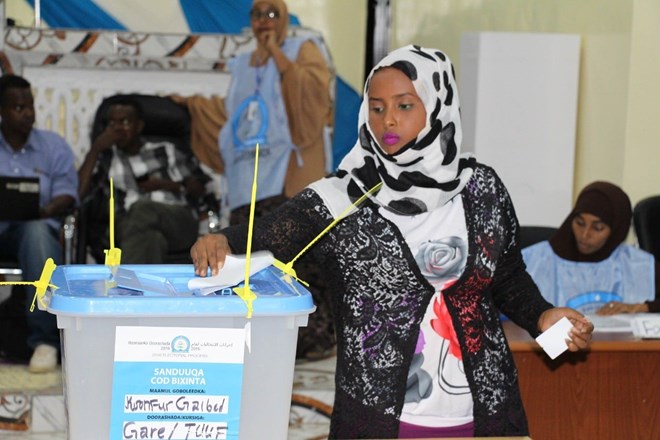Ahmed M. Roble
Monday - February 7, 2022

Historical Dynamics
Historically, Somalia’s
last direct multi-party election was held
in Somalia on
26 March 1969, which was immediately followed by a military coup d'état in October of the same
year. The military junta transformed the country into a single-party state
making the Somali Revolutionary Socialist Party, the only legal
political party led by the late military dictator of Siad Barre. After 21-years
in power, barre’s government collapsed after clan-based armed opposition groups
overthrew the Barre government in 1991, followed by nine years of chaos,
anarchy, and violence.
Starting from the Somalia
National Peace Conference (Arta conference) held in Djibouti on May 2, 2000, Somalia had five
governments through indirect dispensations a nd the long course of
post-conflict reconstruction, developmental support on multiple fronts the
country received, it is once again experiencing an indirect presidential
election in 2022 which is an important milestone for the country.
The state of the ongoing
election is complex, self-serving, illegitimate, and exclusive to the current
administration which will likely produce political conflict and grievances from
the processes which’ll make it a zero-sum game for the long-term reconciliation
and peacebuilding efforts underway in Somalia. Numerous international news
outlet including a New York Times reported election mismanagement after
the 2017 election, claiming that election-corruption and vote buying reached as
high as $20 Million. Similarly, the ongoing election already shows malpractices, illegal efforts to shape
election results and mass vote rigging which’ll spell doom for Somalia.
Election Quagmire
Somalia is facing a political standoff
due to the country’s delayed presidential and parliamentary elections. The
clash over the sacking of the intelligence chief, suspension of prime minister’s
work and take-over of prime minister office. Previous collapse on election
gathering, talks, and deadlines, Somalia seems to have taken a path that could
end the impasse and see parliamentary elections on Feb. 25 as agreed by Somali
Prime Minister and regional leaders after almost a week of intense discussions.
This settled date will more likely be passed due to the grievances from the
election malpractices, army deployments to the expected election sites and
rigging. However, there are sticking points, including allocation of electoral fairness,
and 30% seats in parliament to women.
The ongoing election
gerrymandering, federal/state violence and assault on democracy have de-legitimized
the entire process. The deployment of special federal forces and paramilitary
units in certain regions is aimed at hastening the democratic process using
state violence and intimidation in bid to install a hand-picked, Villa
Somalia/Federal member-states endorsed candidates who are filling up the roster
of incoming elected members of the House of the People. These
include failed politicians linked to plunder of public coffers, as well as
military and intelligence officials, and ex-warlords implicated in human rights
abuses, corruption, and murder. On the other hand, Federal Member States’
leaders are bypassing the process by orchestrating the illegal selection of
dubious “MPs” to serve their own political agenda.
Geopolitical Prospects
Somalia is an African
State for multiple reasons, mainly the geography but it is also an Arab state
as it borders in the Gulf of Aden, it is Asian due to commercial relations to
the Indian Ocean, it is again influenced by the major western investments and
diasporas living in the West. It is an incredibly diplomatic capital which
after materialization in the perfect way with proper leadership mindset could
alter and bring better conditions than the current. Somalia was
always a melting pot under a hot contest due to its strategic geo-location and
marine resources but the lack of commercializing these resources into economic
and political means had always been missing. The Somali leaders over the years
lacked vision with clear strategy and misunderstood that political legitimacy
does not come from foreign endorsement or petrodollar but rather, from genuine
reconciliation and democratic elections.
The Military base at
Berbera-Port and the deal of UAE’s DP World justifies the magnitude of the
contemporary desire and international interest in the Somali waters both by the
Emirates, Ethiopians and beyond it. The Ethiopian Premier had also signed a
deal to earn four port projects with the federal government (FGS) and launched
a pact with the Eritrean and Somali leaders to make an economic zone in the
eastern African countries whilst ignoring Djibouti, a base for world powers. On
the other hand, the role of Turkey in Somalia, is seen as a contributing force
to security, education, and development in the country.
It finally begs no
evidence how Somalia with foreign policy/diplomatic doctrine can shape its
future and play a significant role in the international platforms, but this
comes after assuring that elections and democratic governance is a key pillar
for the internal politics. Somalia has achieved many milestones over the years,
but no milestone is more important than the nascent democratic institutions
built in the face of astonishing constraints. The idea of electing the FGS
leaders every four year makes the country’s fragile peace and state-building
progresses recognized, while much of the external threats stems from the Somali
politicians’ heedlessness of the country’s geo-political importance and national
Interest.
The international community must go beyond its call for
election transparency and insists on putting in place a robust verification
mechanism that reviews the incidents of fraud and embark upon a genuine and
recognized elders are selected to herald the remaining political dispensation.
This election must bring
out leaders with fresh ideas on where our interests lie, identify Somalis friends
from foes, and have a clear understanding on what values are driven by
our foreign policy and how can we as a poor, third world country sell,
partner, and utilize our resources. Curiously enough, the incoming elections
with its leaders must glance back at the faults of our forefathers and try to
drive a lesson in correcting all the wrongdoings and avoid repeating strategic
diplomatic mistakes done in the past.
Ahmed M. Roble: Ahmed holds MBA and
currently pursuing M.A in Peace Governance & Development at the University
for Peace.